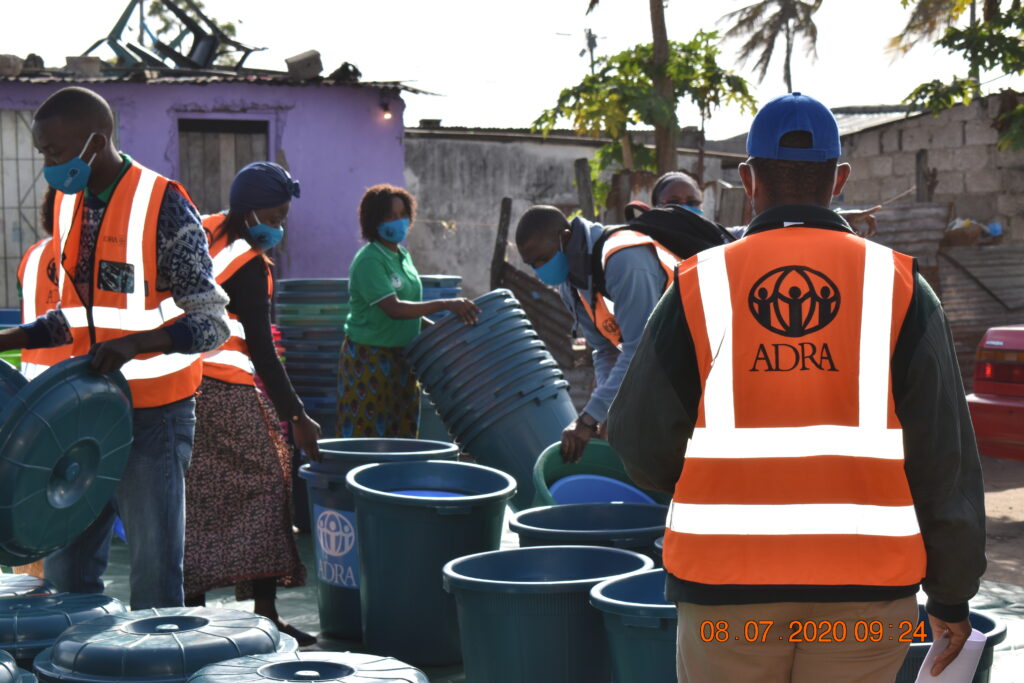Tomac
ADRA Engaged in Preventing COVID-19 and Strengthening Community Resilience in Maputo Province
At a time when Mozambique is mourning hundreds of deaths resulting from COVID-19, the Adventist Development and Relief Agency (ADRA) is supporting around 1,000 disadvantaged families in Maputo Province to prevent the virus and maintain their livelihoods, despite the harmful effects of the pandemic.
Ranked by the International Monetary Fund as one of the 10 poorest countries in the world, Mozambique recorded its worst peak of coronavirus cases and deaths last summer 2021, according to the World Health Organization.

"The situation is very difficult in our country," says Primrose Karuma, ADRA Mozambique's Health Advisor. "The financial difficulties and loss of life caused by the pandemic are pushing the population to higher levels of poverty, which is why we have launched this new project entitled Together Once Again against COVID-19 in order to combat this pandemic and its effects. The project is being implemented in partnership with Viamo and the Eduardo Mondlane University, Faculty of Arts and Social Sciences". This project follows on from a pilot project implemented in the same province in 2020, which also received assistance from the Ministry of Health in the form of medical equipment worth more than 500,000 dollars. To respond to this crisis, ADRA is distributing hygiene kits including masks, hand sanitizers and liquid soap to vulnerable families in the southern region of the country.
Each kit includes a bucket with a tap to create a simple hand-washing station. Trained ADRA volunteers, including the Ministry of Health and religious leaders, are sharing accurate information on basic hygiene practices, prevention and vaccination against COVID-19. In the Boane district, the project is benefiting around 500 vendors who are at high risk of COVID-19 contamination as they interact with the public. In the Matutuíne district, ADRA is assisting 500 of the most vulnerable families, especially those headed by women or children.
ADRA's support goes far beyond meeting the immediate needs of an improved sanitation system. ADRA is supporting vendors to find alternative ways of doing business in order to minimize their exposure to COVID-19, such as operating from home rather than in public markets, as well as training them in other forms of income generation, particularly mask making. In order to improve the nutritional diet of the 500 vulnerable households, ADRA provided support to create home gardens using agriculture
climate-smart. The families benefited from vegetable seed kits and learned how to grow varieties such as pumpkins that are drought-resistant and also provide a very high nutritional value with minimal time and labor requirements. "Our goal is to have 500 home gardens cultivated and producing," says Karuma, adding, "with ADRA's support, these families will be properly equipped to feed themselves and support themselves, even after the pandemic."

Educating the public about COVID-19
ADRA is also launching a public information campaign in the districts of Boane and Matutuíne to raise awareness among the 295113 inhabitants of those districts about the best ways to prevent COVID-19. "Boane and Matutuíne are peripheral districts, and the populations do not have access to adequate information regarding prevention and vaccination against COVID-19 as it is not available in their local languages."[3] "ADRA is working to fill these significant gaps in misinformation," said Primrose. Around half of the Mozambican population does not speak or understand Portuguese, the country's official language. The illiteracy rate is only 28% for women and 60% for men, according to USAID data.[4]
In order to reach these disadvantaged populations, ADRA is disseminating information via audio messages in the local languages, Xangana and Ronga. These messages are broadcast on the radio and are easily accessible on people's cell phones via the country's free 3-2-1 information service. ADRA is also disseminating information in public places through illustrative posters and leaflets that can be understood even by people who cannot read
"ADRA's awareness campaign focuses on maximizing the chances of access to the COVID-19 vaccine for the most vulnerable, clarifying myths and misconceptions about the virus and the vaccine, and supporting people in making informed decisions about vaccination and COVID-19 prevention," says Karuma. ADRA has been working during this period of the pandemic to protect communities from COVID-19 in Mozambique. From June to September 2020, ADRA distributed hygiene kits to 620 families in the suburban areas of the country's capital, Maputo.
In 2021, ADRA provided buckets with taps, liquid soap and masks to the most vulnerable families in Boane and Matituine. "During this time of crisis, ADRA has been bringing together volunteers from local churches, together with our partners in government and education in order to reduce the spread of the virus and support families in need to cope with the impacts of the pandemic," says David Masinde, ADRA's Country Director in Mozambique." We seek to be the hands and feet of Jesus as we minister to our communities in these difficult days," said David. ADRA, the global humanitarian arm of the Seventh-day Adventist Church, has responded to the COVID-19 pandemic around the world and has assisted thousands of families during this time. ADRA's emergency support activities include distributing food and other basic necessities to people in need, providing personal protective equipment and medical supplies in hospitals serving vulnerable communities, and educating the public on combating the virus. To support ADRA's ongoing response to COVID-19, visit adra.org.
